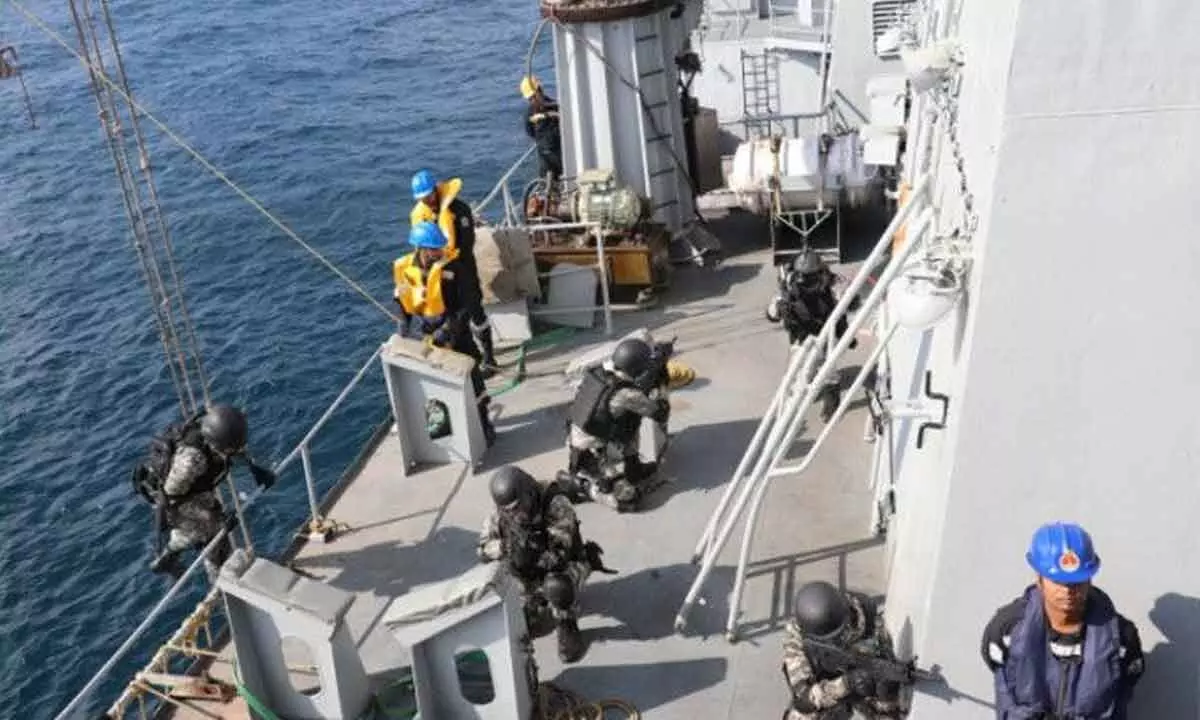Indian Navy emerges as a deterrent force from Red Sea to Indian Ocean
They rescued Iranian, Pakistani and Lankan fishing vessels hijacked by pirates in the Indian Ocean
image for illustrative purpose

As the ripples of the Israel-Hamas conflict reverberate in the Red Sea, with the Iran-backed Houthi rebels intensifying their assaults on cargo ships using drones and long-range ballistic missiles, Somali pirates have surged in the western Indian Ocean. The first month of 2024 seems to have suddenly seen hectic activity in anti-piracy operations amid fears of the old bad days of piracy happening anywhere on the high seas, especially in areas of interest to India. To deal with the ever-increasing threats of pirate attacks, drones and missiles firing on merchant vessels, the Indian Navy has deployed over a dozen warships in the region to repel such incidents. Following the multiple successful naval operations, the Indian Navy has emerged as a potent deterrent force in the Gulf of Aden and the Arabian Sea.
In this week itself, the Indian Navy has successfully thwarted three piracy incidents in almost three days, starting January 27, rescuing Iranian, Pakistani and Lankan fishing vessels hijacked by pirates in the Indian Ocean.
A hijacking incident occurred aboard the Sri Lankan-flagged multi-day fishing trawler Lorenzo Putha 4, approximately 955 nautical miles east of Mogadishu, Somalia. Three pirates boarded and took control of the fishing trawler. Responding to the situation, the Indian Navy dispatched its warship INS Sharda on January 28 and assigned the HALE Sea Guardian MQ9B to locate and intercept the hijacked fishing vessel.
It led a classic multilateral naval operation to thwart piracy with the help of the Sri Lankan Navy and the Seychelles Coast Guard Ship Topaz. The efficient operational coordination and information sharing through Sri Lanka and Seychelles international liaison officers posted at the Information Fusion Centre, Indian Ocean Region IFC-IOR in New Delhi, resulted in the interception of the hijacked fishing vessel by SCGS Topaz in Seychelles Exclusive Economic Zone on January 29.
It marked the Indian Navy’s third successful anti-piracy operation within three days. On the 29th, the INS Sumitra successfully thwarted a piracy attempt on the Iranian-flagged fishing vessel FV Iman, ensuring the safe release of its 17 crew members. The next day, the same warship rescued a crew, comprising 19 Pakistani nationals, from 11 Somali pirates in an operation involving the hijacked Iranian fishing vessel Al Naeemi.
Notably, last week, the Indian Navy rescued a Marshall Islands-flagged oil tanker, Marlin Luanda, linked to the UK with 22 Indians and one Bangladeshi crew member. Indian missile destroyer INS Visakhapatnam swiftly swung into action, and the naval fire-fighting team successfully brought the fire under control after it was hit by a missile.
In the previous week, INS Visakhapatnam intercepted a cargo vessel carrying 22 crew members, including nine Indians, shortly after the Marshall Island-flagged ship faced a drone strike in the Gulf of Aden. On January 5, the Navy successfully prevented the hijacking of the Liberian-flagged vessel MV Lila Norfolk in the North Arabian Sea, rescuing all crew members.
Despite the formidable naval capabilities of major powers like the US and the UK, both state and non-state actors, including pirates, possess increasingly potential and diverse tools for their activities. These actions pose a significant threat to global trade and maritime traffic.
The Indian Navy has played a crucial role in addressing these challenges with its extensive experience and operational reach. While it once deployed only two ships, it now dispatches up to 12 warships across various locations in the western Indian Ocean. This strengthened response is a direct response to piracy in the Horn of Africa and the West Indian Ocean, showcasing Indian Navy's robust and effective approach to dealing with pirates and responding to maritime incidents.
However, pirates adopt diverse tactics to maintain effectiveness as countermeasures become more advanced in multiplayer scenarios. Just a few months ago, the sudden emergence of piracy amidst the Israel-Hamas conflict, igniting the Red Sea with the involvement of the Houthis, was beyond the expectations of strategists.
Seizing an opportunity, the pirates rekindled their operations in the Horn of Africa and the western Indian Ocean.
A recurring pattern reminiscent of the events in 2007 and 2008 is unfolding again when Somali pirates went uncontrollable, and piracy was on the pick. It took the Indian Navy and Coast Guard several years to quell piracy incidents, ultimately restoring control by 2012. This vast experience is the driving force behind the robust and effective deployment of the Indian Navy to address piracy and respond to maritime incidents in the region.
However, the question that remains is whether the Indian Navy will expand its geographical area of operational countermeasures. Moreover, collaborative mechanisms like fusion centres, vessel monitoring and bilateral/multilateral relationships with other naval forces have proved beneficial. These initiatives contribute to maritime domain awareness, facilitate information sharing, and enable direct coordination, ultimately leading to integrated operations against pirates and yielding positive outcomes.
Maritime partnerships with Mauritius, Maldives, Sri Lanka, and Seychelles are significant when it comes to keeping vigil on the high seas.
A few years ago, the Seychelles Defense Forces received the patrol vessel Topaz, which was transferred from the Indian Navy's inventory. These strategic investments have started yielding returns by way of safeguarding freedom of navigation, ensuring open seas, and sustaining global trade without significant disruptions.
(The author is a journalist, who writes on defence, strategic affairs and technology)

